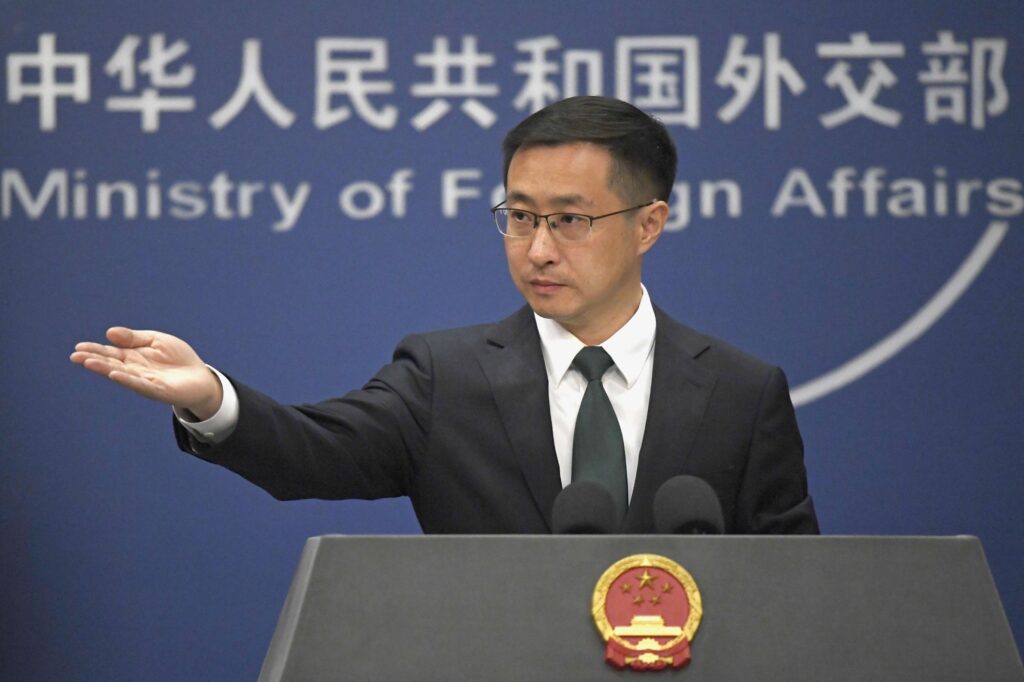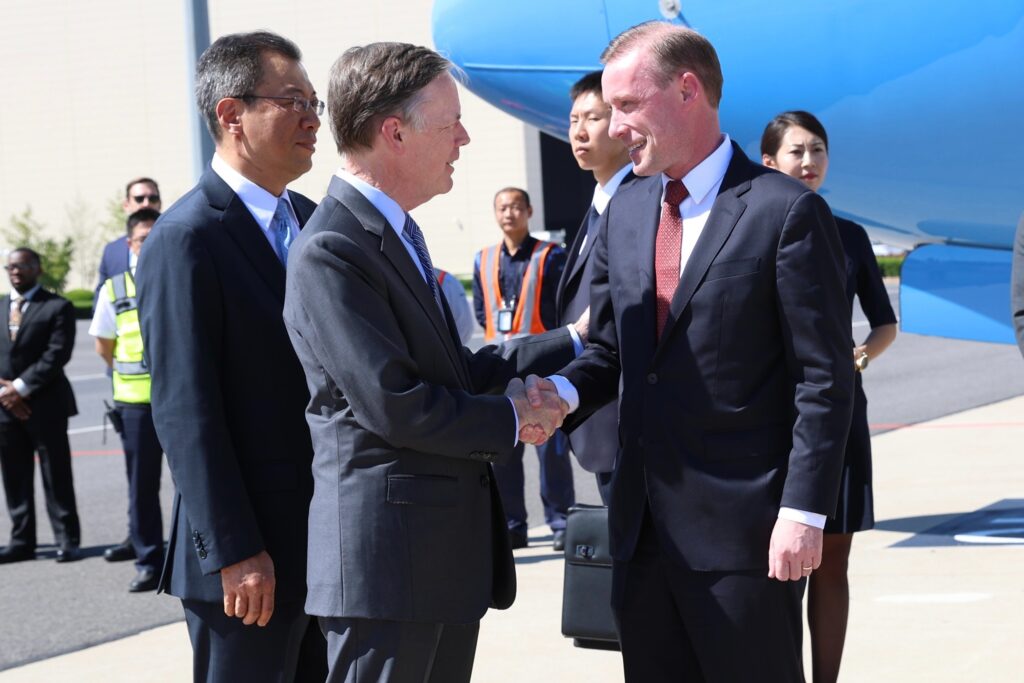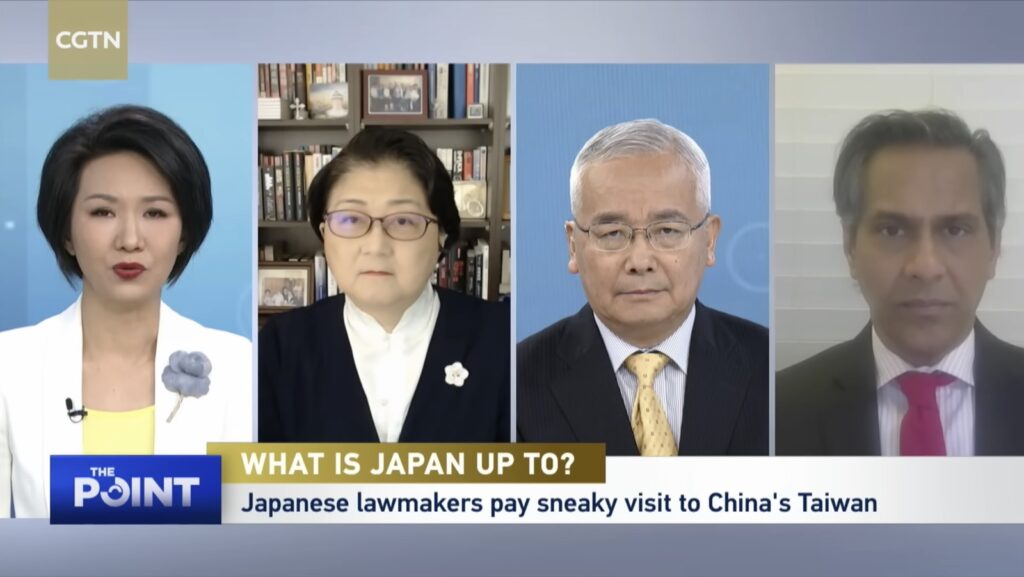
ICAS Bulletin (online ISSN 2836-3418, print ISSN 2836-340X) is published every other week throughout the year at 1919 M St NW, Suite 310, Washington, DC 20036.
The online version of ICAS Bulletin can be found at chinaus-icas.org/bulletins/.

– Several days after the U.S. imposed sanctions on more than 400 entities and individuals for supporting Russia’s “wartime economy,” Chinese Special Envoy for Eurasian Affairs Li Hui criticized “a particular country” for imposing “illegal and unilateral sanctions” to “shift blame” of the Ukraine crisis on China out of “selfish interests.”
– China’s Ministry of Commerce also said earlier that China firmly opposed the new U.S. sanctions as “typical unilateral sanctions” that disrupts global trade and urged the U.S. to immediately halt its “wrong practices.”
– Senior U.S. officials, led by Under Secretary for Civilian Security, Democracy, and Human Rights Uzra Zeya, met with the Dalai Lama in New York to deliver a message of “unwavering support for the Tibetan community.” In response, Beijing said China “opposes government officials of any country to meet with the Dalai Lama in any form” as he is a “political exile” of China.
– The U.S. State Department released a formal statement denouncing the “reckless maneuvers” conducted by China against Philippine vessels in the South China Sea.
Associated News References:
“China calls US sanctions over Ukraine war ‘illegal and unilateral,’” Reuters, August 27
“China opposes US sanctions on firms over alleged ties to Russia’s war efforts,” AP News, August 25
“U.S. Officials Meet Dalai Lama in New York, Triggering Protest From China,” The Wall Street Journal, August 22
“US condemns ‘dangerous actions’ by China against Philippine vessels,” Reuters, August 19

– On August 27, U.S. National Security Advisor Jake Sullivan arrived in Beijing, China, for a three-day state visit with Chinese counterparts, marking the first visit to China by a U.S. national security advisor since 2016.
– Upon arrival, Sullivan first met with Chinese Foreign Minister Wang Yi. Prior to the meeting, both Sullivan and Wang emphasized the need for effective, healthy, productive, and sustainable dialogue in areas of both agreement and disagreement in U.S.-China relations.
– Sullivan and his Chinese counterparts are expected to address a range of issues during their three days of talks, including the fentanyl supply chain, Taiwan, North Korea, the expansion of military-to-military talks, U.S. tariffs, the ongoing conflicts in Gaza and Ukraine, and safety standards for artificial intelligence.
– As part of a two-day meeting of the U.S.-China Financial Working Group in Shanghai in mid-August, the U.S. Department of the Treasury and the People’s Bank of China signed an agreement to cooperate on financial stability. The meeting, attended by representatives from several U.S. and Chinese financial institutions, included a mutual exchange of a list of people to contact in the event of financial stress and was described as candid, pragmatic and constructive.
Associated News References:
“National security adviser Jake Sullivan arrives in China for talks on fentanyl, Taiwan and more,” NBC News, August 27
“Top Chinese, US officials hope for productive talks in Beijing,” Voice of America, August 27
“Biden to dispatch adviser to China as he looks to manage complex US-China relations in final months,” AP News, August 23
“U.S., China sign agreement to cooperate on financial stability,” CNBC, August 19

– The U.S. and Argentina signed a Memorandum of Understanding to boost bilateral investment and trade in critical minerals mining as part of U.S. efforts to reduce reliability on China’s market.
– On August 15, China’s Ministry of Commerce announced that export controls on antimony—a metal used in bullets, nuclear weapons production, and batteries—would take effect in one month. One week later, a spokesperson stated that the export controls were part of national security interests and not directed towards any single country. Experts are speculating whether other minerals, such as tungsten, will also come under similar controls in the future.
– According to The New York Times, a new, highly classified U.S. “nuclear employment guidance” was approved by President Joe Biden in March 2024. This new strategy reportedly marks a shift that reorients U.S. nuclear policy towards focusing on China’s expanding nuclear arsenal, as hinted at by several top officials.
– In response to the reports of a new U.S. nuclear strategy, a Beijing spokesperson said China was “gravely concerned” over the shift, calling it a “convenient pretext to shirk its obligations of nuclear disarmament” and stating that China’s nuclear arsenal is “by no means on the same level with the U.S.” White House officials responded that the new guidance is “not a response to any single entity, country, nor threat.”
Associated News References:
“Argentina, United States ink accord for ‘cooperation on critical minerals,’” Buenos Aires Times, August 23
“China ‘gravely concerned’ by reported US nuclear strategy shift,” The Hill, August 22
“China’s new rules are worrying insiders about how far Beijing will go on controlling critical metals,” CNBC, August 21
“White House downplays Chinese concerns over possible US nuclear strategy change,” Voice of America, August 21
“Biden Approved Secret Nuclear Strategy Refocusing on Chinese Threat,” The New York Times, August 20
“China will limit exports of antimony, a mineral used in products from batteries to weapons,” AP News, August 15

– Amidst the background of U.S. sanctions, Chinese tech giants Alibaba, Tencent and Baidu collectively doubled their capital expenditure in the first half of 2024, with ByteDance also increasing its spending.
– U.S. Tech company IBM is shutting down its research and development department in China and moving it overseas due to intensifying competition in China.
– As the White House moves to announce the final implementation plans to increase U.S. tariffs on certain Chinese imports, some U.S. manufacturers in the electric vehicle and electric utility equipment industries are asking for such tariff rates to be reduced, delayed or abandoned.
– According to recently published public tender documents, several state-linked Chinese entities are utilizing cloud services like Amazon Web Services to access and acquire advanced U.S. chips and artificial intelligence models, legally circumventing U.S. export restrictions.
– U.S. conglomerate Walmart announced that it has sold its $3.74 billion stake in Chinese e-commerce firm JD.com, which reportedly reflects Walmart’s decision to strategically withdraw from the Chinese market.
– WeRide, a leading autonomous driving start-up company in China, is preparing to go public on the New York Stock Exchange within weeks. During the process, the company notably published an extensive list to inform potential investors of relevant geopolitical risks.
Associated News References:
“Despite US Limits On China’s Access To Nvidia Chips, Tech Titans Like Alibaba And Tencent Ramp Up AI Investments,” Bezinga, August 26
“IBM Shuts China R&D Operations in Latest Retreat by U.S. Companies,” The Wall Street Journal, August 26
“US industry seeks easing of steep Biden-Harris China tariff hikes,” Reuters, August 26
“Exclusive: Chinese entities turn to Amazon cloud and its rivals to access high-end US chips, AI,” Reuters, August 23
“Walmart tears up China online strategy with JD.com stake sale,” Reuters, August 21
“A Chinese Self-Driving Start-Up Is About to Go Public in the U.S.,” The New York Times, August 15

– Brandon Wales, who until recently was Executive Director of the U.S. Cybersecurity and Infrastructure Security Agency, says that the presence of Chinese government-backed hackers in U.S. internet providers has “dramatically stepped up from where it used to be.” The Chinese embassy in Washington rejected these accusations, saying that this “false evidence and…disinformation” intends to receive more budgeting.
– The U.S. Department of Justice announced charges against a New York resident and former Chinese pro-democracy activist for providing China’s Ministry of State Security with information on U.S.-based Chinese dissidents from 2018-2023.
– Several U.S. firms with operations in Hong Kong told the Hong Kong government that Hong Kong’s newly proposed, “unprecedented” cyber regulations could grant the Hong Kong government unusual access to their computer systems and dampen technology investments in Hong Kong.
– TikTok, facing an upcoming sell-or-ban order placed due to national security concerns, told a federal appeals court that the Justice Department misstated its ties to China, arguing that TikTok should be protected by the U.S. Constitution and should thus not be required to comply with the law signed by President Joe Biden.
– Two U.S. lawmakers submitted a letter to the U.S. Department of Commerce requesting a probe into China’s TP-Link Technology Co. over concerns that its WiFi routers could be used in cyber attacks in the U.S.
Associated News References:
“Chinese government hackers penetrate U.S. internet providers to spy,” The Washington Post, August 27
“US charges former democracy activist with spying for China,” Al Jazeera, August 22
“US Firms Warn Against ‘Unprecedented’ Hong Kong Cyber Rules,” Bloomberg, August 19
“TikTok disputes US claims on China ties in court appeal,” Reuters, August 16
“US lawmakers urge probe of WiFi router maker TP-Link over fears of Chinese cyber attacks,” Reuters, August 15

“Canada imposes a 100% tariff on imports of Chinese-made electric vehicles, matching the US,” AP News, August 26
“Australia offers U.S. a vast new military launchpad in China conflict,” The Washington Post, August 24
“Kamala Harris says she will ensure America and not China wins ‘competition for 21st century,’” Decan Herald, August 23
“China says it monitored, warned US destroyer in Taiwan Strait,” Reuters, August 22
“Taiwan’s top security officials make secret trip to US for talks,” Financial Times, August 22
“US clinical trials in China questioned by US lawmakers,” Reuters, August 21
“Tim Walz made an impression in China, students and teachers say,” NPR, August 20
“China-US tensions erode co-operation on science and tech,” Financial Times, August 19
“‘Monument to history’ battle between US and China over future of Mao’s secretary’s diary,” The Guardian, August 18
“China’s AMEC sues U.S. defence department over ‘military company’ label,” Reuters, August 16
“Black Myth: Wukong” — an Inspiration for Foreign Businesses’ Journey to the East
By Yilun Zhang
August 23, 2024
“Black Myth: Wukong” has been the most trending topic in China and the global gaming industry in recent days. The game is widely regarded as a groundbreaking milestone for the Chinese gaming industry. It is the first mainstream video game to feature an in-depth adaptation of “Journey to the West,” a 16th-century great novel rooted in traditional Chinese mythology. The classic is so well-known in East Asian culture that it has inspired characters like Goku in “Dragon Ball.” While many may attribute the game’s success to a surge of national pride or the novelty of being China’s first-ever AAA game, the real story runs much deeper…
Media Manipulation and Strategic Tension: The Philippines’ Role in the South China Sea Dispute
By Nong Hong
August 22, 2024
The South China Sea has long been a flashpoint for geopolitical tension, with multiple nations vying for control over this critical maritime region. In recent years, some of the most contentious interactions in the South China Sea have involved China and the Philippines, two nations whose conflicting claims have fueled numerous confrontations over the years, particularly since 2021, when they became embroiled in a standoff over the Second Thomas Shoal, triggered by the Philippines’ resumption of resupply missions in the disputed area.
Recently, these clashes have escalated, sparking international concern and media scrutiny…
Taiwan Needs to Preserve the Globalized Semiconductor Industry, Before It Becomes Too Late
By Wyatt Huang
August 20, 2024
The Biden Administration recently announced its plan to impose a new rule that would further restrict foreign partners’–including Taiwan’s—ability to export semiconductor manufacturing equipment to Mainland China. With the purpose of protecting national security and supply chain resilience, this measure adds to the already-comprehensive list of export controls enacted in October 2022 and October 2023 and further decouples Mainland China from the global semiconductor ecosystem. However, the true victim of this decoupling process is not the two superpowers. It is Taiwan’s semiconductor industry. With competitive pressure in opposite directions stemming from the United States and Mainland China, Taipei needs to advocate for maintaining the globalized semiconductor industry before it is too late…
With Kishida’s Resignation, Japan Brings More Economic Uncertainties to Asia in a U.S. Election Year
By Yilun Zhang
August 19, 2024
Following two significant interventions, a disastrous fall and the subsequent unnatural recovery, the Japanese economy has finally attracted the scrutiny it deserves. For the better part of 2023 and the first half of 2024, many observers have been quick to praise Japanese economic recovery, particularly with the Japanese stock surging over 20% from January to June this year, peaking at its highest level in 33 years. But yet, contrary to these arguments, unfortunately, Japan is not back…
Bringing down tariffs can bring down the risk of a U.S. recession
By Qiyun (James) Duan
August 22, 2024
he U.S. Federal Open Market Committee (‘the Fed’) has maintained a high target range of its policy rate between 5.25% and 5.5% to combat inflation since the Covid-19 pandemic. However, the unsatisfying employment report and increase of expense of goods and services have markedly concerned U.S. consumers and businesses…
On Friday, August 16, 2024, Senior Fellow Sourabh Gupta was interviewed by CGTN’s The Point with Liu Xin on Japan’s ties with Taiwan and the implications for China-Japan and Cross-Strait relations.


The Institute for China-America Studies is an independent nonprofit, nonpartisan research organization dedicated to strengthening the understanding of U.S.-China relations through expert analysis and practical policy solutions.
1919 M St. NW Suite 310,
Washington, DC 20036
icas@chinaus-icas.org
(202) 968-0595
© 2025 INSTITUTE FOR CHINA-AMERICA STUDIES. ALL RIGHTS RESERVED.